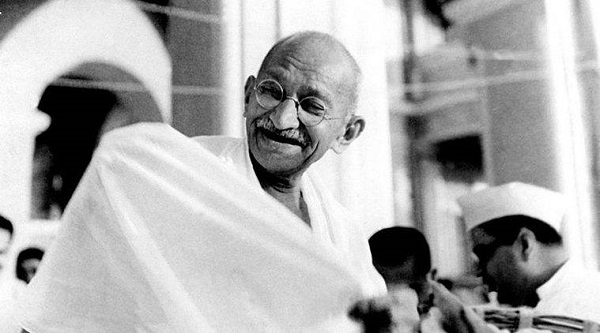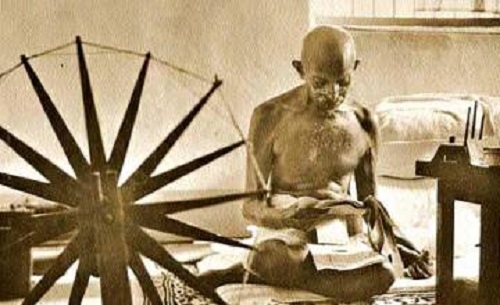His experiments with Truth! 6 must read Gandhiji tales-
Total Views | 63
-Siddhi Somani
'I have nothing new to teach the world. Truth and non-violence are as old as hills', Gandhiji used to say as he believed. We all know his 'story of experimenting with truth' and patience. But, do we know- though he said he didn't, he had a lot to teach to the masses.. and that too in super short courses of conversations or incidents? Gandhiji, the Father of Nation, was and is truly a Father, who by dint of his existence weaved innumerable stories, all with morals, all with valuable lessons to learn!
1. Strengthening the faith-
The night was very dark and Mohan was frightened. He had always been afraid of ghosts. Whenever he was alone in the dark, he was afraid that a ghost lurking in some dark corner would suddenly spring on him. And tonight it was so dark that one could barely see one's own hand. Mohan had to go from one room to another. As he stepped out of the room, his feet seemed to turn to lead and his heart began to beat like a drum. Rambha, their old maidservant was standing by the door. "What's the matter, son?" she asked with a laugh. "I am frightened, Dai," Mohan answered. "Frightened, child! Frightened of what?" "See how dark it is! I'm afraid of ghosts!" Mohan whispered in a terrified voice. Rambha patted his head affectionately and said, "Whoever heard of anyone being afraid of dark! Listen to me: Think of Rama and no ghost will dare come near you. No one will touch a hair of your head. Rama will protect you." Rambha's words gave Mohan courage. Repeating the name of Rama, he left the room. And from that day, Mohan was never lonely or afraid. He believed that as long as Rama was with him, he was safe from the danger. This faith gave Gandhiji strength throughout his life, and even when he died the name of Rama was on his lips.

2. Hard work deserves praise-
In South Africa Gandhiji set up an ashram at Phoenix, where he started a school for children. Gandhiji had his own ideas about how children should be taught. He disliked the examination system. In his school he wanted to teach the boys true knowledge—knowledge that would improve both their minds and their hearts. Gandhiji had his own way of judging students. All the students in the class were asked the same question. But often Gandhiji praised the boy with low marks and scolded the one who had high marks. This puzzled the children. When questioned on this unusual practice, Gandhiji one day explained, "I am not trying to show that Shyam is cleverer than Ram. So I don't give marks on that basis. I want to see how far each boy has progressed, how much he has learnt. If a clever student competes with a stupid one and begins to think no end of himself, he is likely to grow dull. Sure of his own cleverness, he'll stop working. The boy who does his best and works hard will always do well and so I praise him." Gandhiji kept a close watch on the boys who did well. Were they still working hard? What would they learn if their high marks filled them with conceit? Gandhiji continually stressed this to his students. If a boy who was not very clever worked hard and did well, Gandhiji was full of praise for him.
3. Keeping promises-
This incident occurred when Gandhiji was practising law in the city of Johannesburg in South Africa. His office was three miles from his house. One day a colleague of his, Mr Polak, asked Gandhiji's thirteen-year old son, Manilal to fetch a book from the office. But Manilal completely forgot till Mr Polak reminded him that evening. Gandhiji heard about it and sent for Manilal. He said, "Son, I know the night is dark and the way is long and lonely. You will have to walk nearly six miles but you gave your word to Mr Polak. You promised to fetch his book. Go and fetch it now." Ba and the family were upset when they heard of Gandhiji's decision. The punishment seemed far too severe. Manilal was only a child, the night was dark and the way lonely. He had only forgotten a book after all. It could be brought the next day. This was what they all felt, but no one had the courage to say anything. They knew that once Gandhiji's mind was made up, nobody could change it. At last Kalyan Bhai plucked up courage. "I'll fetch the book," he offered. Gandhiji was gentle but firm, "But the promise was made by Manilal." "Very well, Manilal will go but let me go with him," Kalyan Bhai pleaded. Gandhiji agreed to this and Manilal set off with Kalyan Bhai to fetch the book. The kind and gentle Gandhiji could be firm as a rock at times. He saw that Manilal kept his word and did as he had promised.

4. The one with Gandhi, Patel and the snake-
One day Gandhiji and Vallabhbhai Patel were talking in the Yaravada jail when Gandhiji remarked, "At times even a dead snake can be of use." And he related the following story to illustrate his point: Once a snake entered the house of an old woman. The old woman was frightened and cried out for help. Hearing her, the neighbours rushed up and killed the snake. Then they returned to their homes. Instead of throwing the dead snake far away, the old woman flung it onto her roof. Sometime later a kite flying overhead spotted the dead snake. In its beak the kite had a pearl necklace which it had picked up from somewhere. It dropped the necklace and flew away with the dead snake. When the old woman saw a bright, shining object on her roof she pulled it down with a pole. Finding that it was a pearl necklace she danced with joy! When Gandhiji finished his story, Vallabhbhai Patel said he too had a story to tell: One day a bania found a snake in his house. He couldn't find anyone to kill it for him and hadn't the courage to kill it himself. Besides, he hated killing any living creature. So he covered the snake with a pot and left it there. As luck would have it, that night some thieves broke into the bania's house. They entered the kitchen and saw the overturned pot. "Ah," they thought, "the bania has hidden something valuable here." As they lifted the pot, the snake struck. Having come with the object of stealing, they barely left with their lives.
5. Valuing people, valuing emotions-
Gandhiji went from city to city, village to village collecting funds for the Charkha Sangh. During one of his tours he addressed a meeting in Orissa. After his speech a poor old woman got up. She was bent with age, her hair was grey and her clothes were in tatters. The volunteers tried to stop her, but she fought her way to the place where Gandhiji was sitting. "I must see him," she insisted and going up to Gandhiji touched his feet. Then from the folds of her sari she brought out a copper coin and placed it at his feet. Gandhiji picked up the copper coin and put it away carefully. The Charkha Sangh funds were under the charge of Jamnalal Bajaj. He asked Gandhiji for the coin but Gandhiji refused. "I keep cheques worth thousands of rupees for the Charkha Sangh," Jamnalal Bajaj said laughingly "yet you won't trust me with a copper coin." "This copper coin is worth much more than those thousands," Gandhiji said. "If a man has several lakhs and he gives away a thousand or two, it doesn't mean much. But this coin was perhaps all that the poor woman possessed. She gave me all she had. That was very generous of her. What a great sacrifice she made. That is why I value this copper coin more than a crore of rupees."

6. A Stone- Test of carelessness-
This incident occurred in Noakhali. After the Hindu-Muslim riots Gandhiji toured the area on foot to reassure and comfort the people. He would set off from a village soon after dawn and arrive at the next village after sunset. On arrival he would first attend to his work then he would take a bath. Gandhiji used a rough stone to clean his feet. Miraben had given this stone to him many years ago and Gandhiji had kept it carefully ever since. He took it with him everywhere. One evening after they had arrived at a village and Manu was getting Gandhiji's bath ready, she noticed that the stone was missing. She looked everywhere but could not find it. She told Gandhiji that the stone was lost and added, "It must have been left behind at the weaver's where we stayed yesterday. What should I do now?" Gandhiji thought for a moment. Then he said, "Go and fetch the stone. If you suffer once, you'll not forget another time." "Can I take someone with me?" Manu asked. "Why?" questioned Gandhiji. Manu was silent. She did not want to admit that she was frightened to go alone. The road to the village lay through forests of betelnut and coconut and it was easy to lose one's way. Besides, Manu was barely sixteen years old and she had never gone anywhere alone. But she could not think of an answer.
So Manu took the path they had taken earlier in the day. Carefully following the old footprints she managed to reach the village and find the weaver's house. The old woman who lived there recognised her and welcomed her warmly. Tired and rather irritated Manu told her why she had come. But how was the old woman to have known that that bit of stone was so valuable? She had thrown it away with the rubbish. They both began to search for it. At last much to Manu's joy they found it. Many had left the house at 7.30 in the morning. By the time she returned it was past one in the afternoon. She had walked nearly fifteen miles. Worn out, hungry and irritated she went straight to Gandhiji and put the stone in the lap. Then she burst into tears. "This stone was a real test for you," Gandhiji told her gently. "Do you know that this stone has been with me for the last twenty-five years. It has gone with me everywhere, from jails to mansions. I can easily get another stone like it, but I wanted you to learn that it is bad to be careless." "I've never prayed as hard as I did today," said Manu. "I want to make women brave and fearless", Gandhiji said. "Today not only you but I too learnt a lesson." Manu did not say anything but she must have thought Gandhiji's methods were very unusual.
Bharati Web







